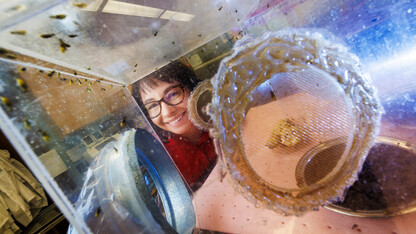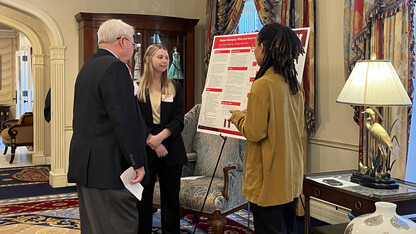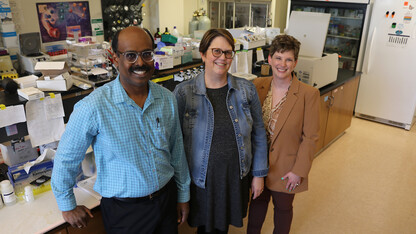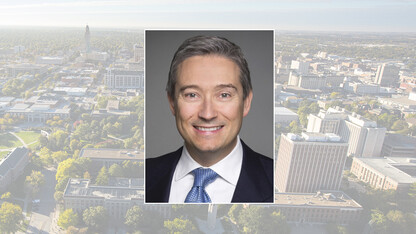· 5 min read
Nebraska in the national news: April 2018

A study showing that humans and their ancestors are responsible for an unprecedented wave of large-mammal extinctions was featured in numerous publications in April. The articles were among 25 national news stories featuring University of Nebraska–Lincoln faculty and students during the month.
Kate Lyons, assistant professor of biological sciences at Nebraska, co-authored the study, which originally appeared in the journal Science.
Lyons was quoted in stories in USA Today, NBC News, the New York Post, the Independent, Inquisitr and Futurity, among dozens of other media outlets.
The study also noted that the “downsizing” trend may continue, with a domestic cow possibly being the largest mammal in 200 years.
“It wasn’t until human impacts started becoming a factor that large body sizes made mammals more vulnerable to extinction,” Lyons said. “(The extinctions) occurred not very long after the birth of us as a species. It just seems to be something that we do.”
Other coverage:
A massive study led by Marilyne Stains, chemistry, found that traditional lecturing has persisted in STEM classrooms despite calls to replace it with more student-centered approaches. The study was featured in Inside Higher Education on April 2 and on the website Futurity on April 5. The study was first published in Science.
Matt Spangler, beef genetics specialist with Nebraska Extension, was quoted in an April 2 AgWeb.com article on bull buying. Spangler said it is similar to grocery shopping.
The Chiara String Quartet was featured in an April 3 article on BroadwayWorld.com. The quartet, Hixson-Lied Artists-in-Residence at Nebraska, will perform May 12 at the Metropolitan Museum of Art in New York
New research led by Kevin Smith, political science, shows that liberals tend to express more emotions with their faces than conservatives do. The website Futurity ran an article on the research April 5.
Kelsy Burke, sociology, wrote an April 5 piece for The Conversation about the Christian right opposing pornography but still supporting President Donald Trump. Burke wrote that evangelical logic supposes that giving in to sexual temptations is part of the human condition. The article was picked up by Newsweek, International Business Times and several other media outlets across the country.
John Hay, extension educator with Nebraska Extension, was interviewed for a story in the April 2018 issue of The Furrow, a John Deere publication, on farmers and ranchers tapping into solar energy.
A research team at Nebraska has found that pinyon jays are more likely to share food when given high doses of the hormone mesotocin. The Independent ran a story on the study April 11. The study originally appeared in the journal Biology Letters.
Susan Swearer, educational psychology, was interviewed for an April 14 article in the Forum of Fargo-Moorhead about an alleged “rape game” played by teenage boys at a North Dakota school. The article appeared in at least six other North Dakota publications.
Swearer was also quoted in an April 21 NPR story on adolescents engaging in digital self-harm — anonymously posting mean and derogatory comments about themselves on social media.
Adam Thimmesch, law, was interviewed for an April 16 Minneapolis Star-Tribune story on South Dakota v. Wayfair, Inc., a Supreme Court case to determine whether states can collect sales taxes on online and other kinds of remote purchases.
Brian Fuchs, associate geoscientist and climatologist at the university’s National Drought Mitigation Center, was quoted in an April 17 Huffington Post story on drought and potential water shortages in the United States. He said the jury was still out on the intense drought area in the Southwest.
Fuchs was also featured in an April 23 Associated Press article on lingering drought in the southwestern United States. The story was picked up by MSN News and more than 60 other media outlets across the country.
Paul Blum, biological sciences, was interviewed for an April 20 article in The Guardian about N-001 — a drug developed at his biotech startup company, Neurocarrus, that is designed to treat severe and chronic pain without the high of opioids. N-001 is a localized treatment designed to target pain at its source via an injection or topical solution.
Conner Kranda, a sophomore at Nebraska, caught a punt to win $25,000 as part of a contest during Nebraska’s football spring game on April 21. The Omaha World-Herald ran a feature story on Kranda on April 24. It was picked up by more than 40 media outlets nationwide.
Ali Tamayol, assistant professor of mechanical and materials engineering at the University of Nebraska–Lincoln, and researchers from MIT and Massachusetts General Hospital have incorporated platelet-rich plasma into a bio-ink: a 3-D-printed mixture of cells and gel that could eventually be part of skin grafts and regenerative tissue implants. The website Futurity ran an article on the research April 24.
Josephine R. Potuto, law, was interviewed for an April 26 Inside Higher Ed article on a special commission’s recent recommendations to reform college basketball.
Robert C. Denicola and Richard Dooling, law, penned an op-ed piece about copyright law and computer-generated works for the April 27 Wall Street Journal.
Jennine Capó Crucet, English and ethnic studies, wrote an April 28 op-ed piece for The New York Times on her decision to turn down a full-tuition scholarship to the University of Florida to attend Cornell University.
Faculty, administration, student and staff appearances in the national media are logged at http://newsroom.unl.edu/inthenews. If you have additions to this list, contact Sean Hagewood at shagewood2@unl.edu or 402-472-8514. If you have suggestions for national news stories, contact Leslie Reed at lreed5@unl.edu or 402-472-2059.







